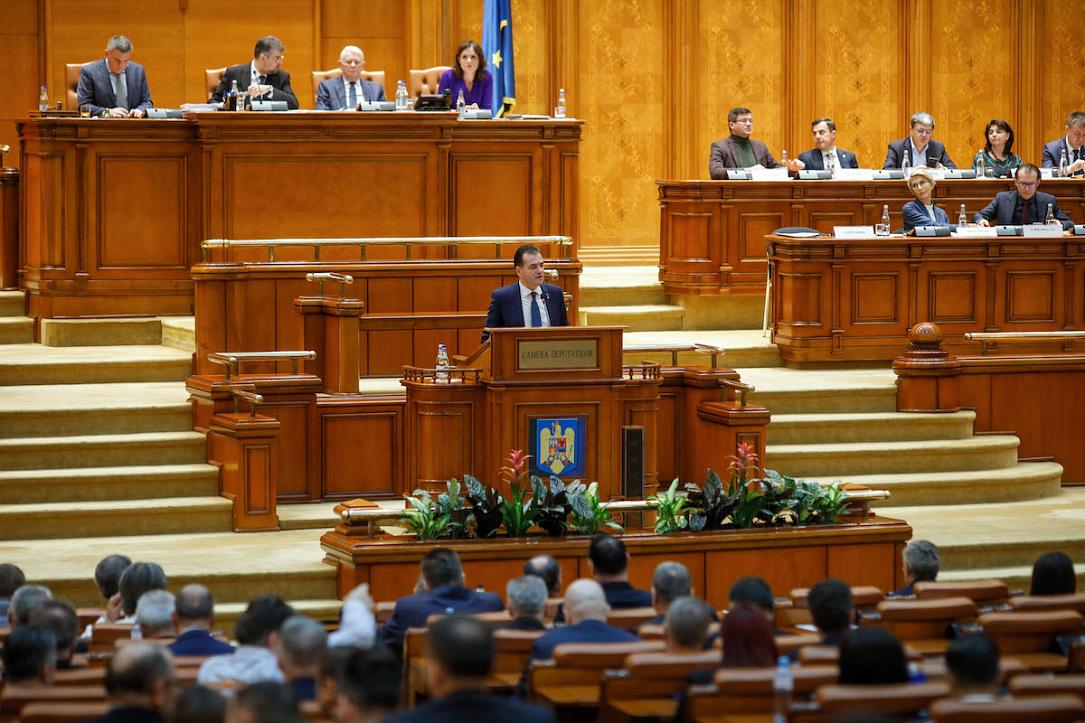Romania's PM presents to the Parliament the budget for 2020, to be passed with no vote

Romania’s prime minister Ludovic Orban presented on Monday, December 23, to the joint chambers of the Romanian Parliament, the 2020 budget bill and a bill aimed at reversing the effects of the emergency ordinance (OUG) 114/2018 adopted by the previous Government in December 2018. The Orban Government is taking responsibility for these bills so they can pass without debate and vote in the Parliament, which could change some of their provisions.
The Government envisages 4.1% GDP growth next year “in line with the projections of the state forecasting body and the European Commission,” PM Orban stated. However, the European Commission in its Autumn Forecast projected 3.6% GDP growth for 2020 and the state forecasting body CNP is under Government’s supervision. Independent analysts, like the chief economist of ING Bank Romania Ciprian Dascalu, see the growth rate in 2020 below 3% (Dascalu mentioned 2.7%).
The Government also assumed an average exchange rate of RON 4.75 to EUR and an average annual inflation rate of 3.1% in 2020 - figures that are slightly optimistic compared to those of Romania’s National Bank (BNR) or CFA Association. The latter see the inflation easing indeed, but only to 3.52% as of November 2020 - which would result in an average inflation of around 3.6% for 2020. CFA Association also sees steeper local currency depreciation, albeit not dramatic in absolute terms, to RON 4.86 to EUR from RON 4.77 to EUR.
The big problems with the 2020 budget planning come, however, rather from the unplanned expenditures or lower revenues as an effect of bills passed by the Parliament at the request of the opposition. The 2020 budget plan does not include the doubling of the child allowance - a decision already passed by the lawmakers that would cost the budget some 0.5% of GDP. It doesn’t include the lower VAT rate of 16% (5% for food goods) promoted by the opposition that, indeed, stands weaker odds being endorsed. However, PM Orban expects to reverse even the vote on the child allowances, as implied by his statements. “It is petty politics with no fundamentals in real life,” Orban stated in an interview with the public radio station. No plans on challenging the bill were announced by the ruling Liberal Party, though.
Speaking about the 2020 budget law, PM Orban told lawmakers that more money is earmarked for education and healthcare, compared to 2019, and EUR 4.6 billion worth of European funds will be available for infrastructure projects. On the downside, most of the European funds will be needed by projects already started in the past - therefore only a small part of it will be given for new projects. However, Orban claimed that expenditures for new infrastructure projects like Comarnic - Brasov and Ungheni - Iasi motorways were “included” in the budget. A higher share of the tax revenues will be given to local administration, while half of the social expenditures will be covered from the central government budget.
Parties from both the ruling coalition and opposition have submitted amendments that the Government can include or not in the final version of the bills. The opposition’s leader, Marian Ciolacu - who serves as head of the Social Democratic Party (PSD) and speaker of the Chamber of Deputies, announced plans to challenge the bill at the Constitutional Court on procedure issues. The budget bill must be debated by lawmakers, Ciolacu argued. Separately, PSD might challenge the bills on other grounds, he stated.
The 2020 budget bill is based on a macroeconomic scenario seen as optimistic by the Fiscal Council, which also warned about the optimistic estimate of revenues and expenditure needs as well while urging the Government to carry a risk analysis. In regard ti the latest request, finance minister Florin Citu said that he would set up a dedicated expert team formed by trained economists (as opposed to the tax inspectors carrying this functions in the past).
Speaking of the bill to change OUG 114, Orban announced that the 2% turnover tax for the energy companies was abolished. The managers of mandatory private pension funds will no longer have to increase their capital to the levels stipulated in OUG 114. The sovereign investment and development fund will no longer be set up. Projects started under this program, if any, will be financed under other programs.
Separately, PM Orban announced that the bill includes additional provisions, not related to OUG 114. The most important one bans people who receive state pension to also be employed in the public system. Those who are in this situation will have to choose between pension and salary. Exceptions for specific areas are included, such as for schools or Romanian Academy.
An important amendment accepted by the Government was related to deferring by one year the law that entitles local elected public servants to special pensions. If they come into force, such rights can not be abolished in the future, PM Orban commented, in the context of a bill on abolishing special pensions (namely those not based on past contributions) being debated by lawmakers.
editor@romania-insider.com
(Photo source: Inquam Photos / George Calin)
















